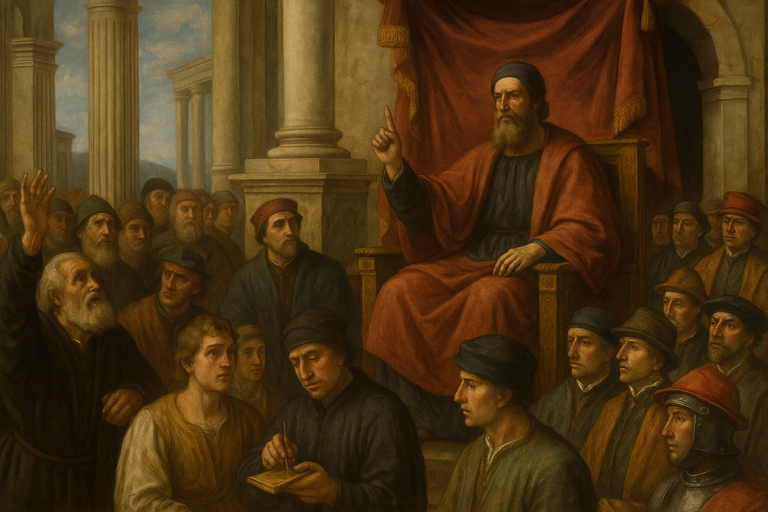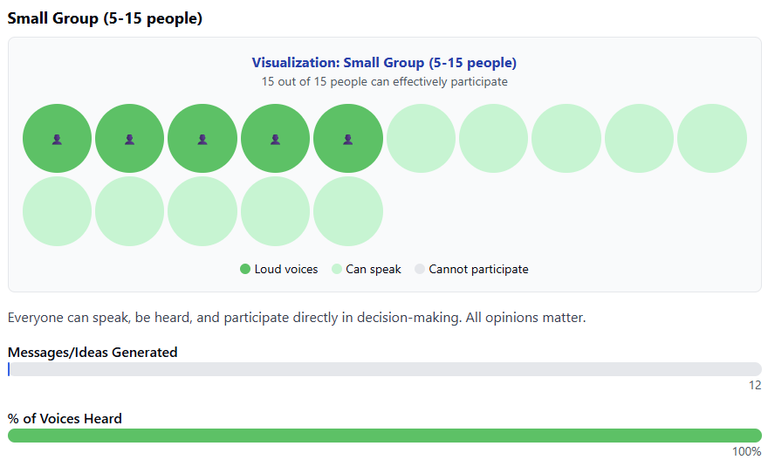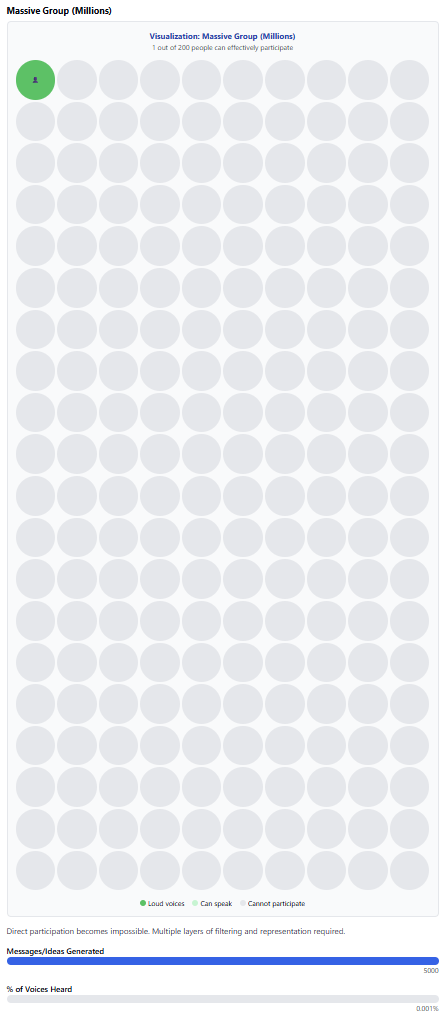
In small groups, decision-making is remarkably fluid. When five friends decide on a restaurant for dinner, everyone speaks, everyone listens, and consensus emerges naturally. But try scaling this approach to a city, country, or global organization, and things quickly break down. This is not merely a practical issue—it's a fundamental mathematical and cognitive limitation that affects every form of collective governance.
The Scaling Problem of Traditional Governance
As group size increases, traditional governance systems face several unavoidable bottlenecks:
1. The Participation Paradox

In small groups (5-15 people), participation rates approach 100%. Everyone can speak, be heard, and contribute meaningfully to decisions. But this relationship doesn't scale linearly:

- In medium-sized groups (50-200 people), participation drops to roughly 40%

- In large groups (1000+ people), only about 2% of voices are effectively heard

- In massive groups (millions), participation plummets to fractions of a percent.
This isn't just about fairness—it's about information loss. When 98% of voices go unheard in large groups, we're making decisions based on a tiny fraction of available wisdom and perspective.
2. The Proposal Funnel Problem

Most governance systems separate two functions:
- Proposing options (what can be voted on)
- Deciding between options (voting)
While everyone may have equal voting rights, very few have equal "proposing rights." Consider a typical democratic process:

- Millions of potential ideas exist among constituents
- Only those with access to proposal mechanisms (representatives, officials) can advance ideas
- Committees and authorities further filter proposals
- A tiny fraction becomes available for voting
- An even smaller subset gets implemented
This creates an enormous bottleneck where most potential solutions never reach consideration, regardless of their merit.
3. The Cognitive Bandwidth Constraint
Human cognition can only process so much information. In a community of 10,000 members where each person has just one idea, no single individual could meaningfully review all 10,000 proposals.
This creates a fundamental upper limit to direct participation that no amount of technology can solve within traditional voting frameworks.
The Two-Step Problem
Traditional governance relies on two sequential processes, both of which face scaling limitations:
Step 1: Proposal Mechanism
- Limited by who can propose
- Information bottlenecks at each level
- Hierarchical filtering loses valuable information
- Only a small subset reaches consideration
Step 2: Voting Mechanism
- Limited to pre-filtered proposals
- Binary or limited-choice decisions only
- Cannot capture nuanced perspectives
- Cognitive limits on number of items
As communities grow, both steps become increasingly inefficient, losing information and failing to represent true collective will.
The Tau Approach: A Paradigm Shift

The Tau project proposes a fundamentally different approach to collective governance—one that scales mathematically and cognitively to groups of any size:
Instead of separating proposing and voting into distinct processes, Tau allows:
Express Complete Worldviews
- Users express comprehensive requirements in a logical language
- No limit on information expression
- No filtering of perspectives
- All voices equally represented
Automated Synthesis
- AI processes all expressions logically
- Maps agreements and disagreements
- Identifies consensus without voting
- Reveals where true disagreements exist
This isn't just an incremental improvement—it's a complete reimagining of how collective decisions can work.
Why This Matters
The scaling limitations of traditional governance aren't just theoretical problems. They manifest as:
- Increasing polarization as nuanced perspectives get lost
- Growing feeling that "my voice doesn't matter"
- Concentration of power in fewer hands
- Solutions that fail to incorporate diverse insights
- Growing governance crises around the world
If we're to tackle our most complex global challenges—from climate change to technological risks—we need governance systems that can effectively harness our collective intelligence at scale.
The Tau approach suggests that rather than optimizing an inherently limited system, we can transcend these limitations through a new paradigm that treats governance as a knowledge synthesis problem rather than a voting problem.
Whether or not Tau itself becomes the solution, its approach points toward an important direction for governance innovation: not better voting systems, but fundamentally different ways of capturing and synthesizing collective knowledge.
Here are some visualizations to help aid your understanding:
- https://claude.ai/public/artifacts/1ca25552-a6a1-493b-8838-42aefd9c224b
- https://claude.ai/public/artifacts/833ce32b-aa72-44db-8030-ddf1f5deb028
- https://claude.ai/public/artifacts/acb10783-d62f-49d9-b401-9ee2df6caa7d
More info @ https://tau.net and https://tau.ai
I checked out Tau's roadmap and it seems we are close to the Beta stage. Do you have any info on ETA for the next steps. By the way, I still have the messages of us trading Agoras in our PJs!
Lol it’s been a long time since I used Discord. Good times! As for the ETA, we’re still waiting for the demo of Tau Language, then the testnet.
Are all voices equally important? I know this question is heresy in an egalitarian democratic worldview, but we have biases to address. On one hand, we have flat earthers whose opinions are entirely irrelevant to matters of science, but on the other hand, we have an ivory tower intellectual class who prefer status over serious inquiry, and want to stifle dissent. How does Tau, or anything else, resolve this?
It also fails to answer the deeper question of whether any given matter needs to be a governance issue or not. It looks like a bandwagon fallacy with extra steps no matter what. How can we decentralize instead?
Tau is part logical aid. Let people say whatever they want and Tau will show contradictory statements etc. The network can decide which matter is a governance issue or not.
#hive #posh
Both blogs are uniquely thought-provoking—one explores a 3D art gallery experience that showcases modern creativity, while the other offers a deep analysis of decision-making systems. Do you think digital technology and AI can bring revolutionary changes to both art exhibitions and governance in the future?